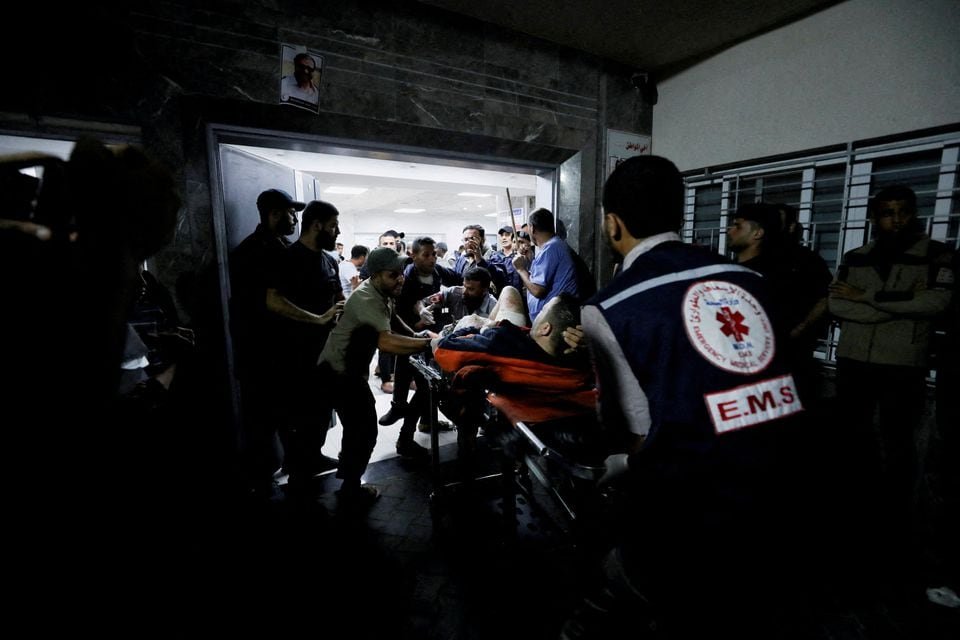In Gaza, hospital procedures without anesthetics prompted screams and prayers. The small girl was wailing in anguish and shouting, “Mummy, Mummy,” while the nurse sewed up her head wound without using any anesthetic because none was available at the moment at Al Shifa Hospital in Gaza City.
That was one of the worst instances nurse Abu Emad Hassanein could recollect as he explained the effort to deal with an extraordinary flood of wounded patients and a lack of pain management drugs since the conflict in Gaza started a month ago.
“Sometimes we give some of them sterile gauze (to bite on) to reduce the pain,” explained Hassanein.
“We know that the pain they feel is more than someone would imagine, beyond what someone their age would stand,” he added, referring to youngsters like the girl with the head wound.
Arriving at Al Shifa to have the dressing changed and disinfection applied to a cut on his back caused by an air strike, Nemer Abu Thair, a middle-aged man, stated that he was given no pain treatment when the wound was first sewn up.
“I kept reciting the Koran until they finished,” he stated. The battle started on October 7 when Hamas terrorists surged over the Gaza Strip’s border barrier with southern Israel. Israel believes Hamas killed 1,400 people and abducted 240 on the bloodiest day of violence in Israel’s history.
Israel replied with an air, sea, and land assault on the densely populated, Hamas-controlled enclave, which health authorities in Gaza claim has killed more than 10,800 Palestinians.
Mohammad Abu Selmeyah, the director of Al Shifa Hospital, said that when vast numbers of injured persons have been brought in at the same time, there has been little alternative but to deal with them on the floor without proper pain medication.
Using the incident at the Al Ahli Arab Hospital on October 17 as an example, he noted that over 250 injured patients came to Al Shifa, which only has 12 operating rooms. “If we had waited to operate on them one by one, we would have lost many of the wounded,” stated Abu Selmeyah.
“We were forced to operate on the ground and without anaesthesia, or using simple anaesthesia or weak pain killers to save lives,” he stated.
According to Abu Selmeyah, without providing more details, procedures carried out by Al Shifa personnel in similar situations have included amputating limbs and fingers, suturing severe wounds, and treating severe burns.
PAIN OR DEATH
“It is terrible for the medical staff. It is not straightforward. Either the patient endures agony or loses his life,” he stated. Israel says a botched rocket launch by the Palestinian Islamic Jihad militant organization caused the incident at the Al Ahli Arab Hospital. Hamas and Palestinian Islamic Jihad accused Israeli airstrikes. The United States, an ally of Israel, stated that its analysis of intelligence data validated Israel’s justification.
At Nasser Hospital in Khan Younis, in the south of the Gaza Strip, director Dr Mohammad Zaqout said there had been a period early in the conflict when anesthetic supplies ran out altogether until assistance vehicles were permitted.
“Some procedures were carried out without anesthesia, including Caesarian sections on women, and we were also forced to operate on some burns that way too,” stated Zaqout. He said that although staff members tried their utmost to reduce patients’ agony with less potent drugs, this was insufficient.
“This is not the ideal solution for a patient inside an operating theatre, who we want to operate on with full anaesthesia,” he stated.
No help could enter Gaza during the first twelve days of the conflict. The first convoy of relief vehicles entered the strip on October 21 via the Rafah Crossing, located on its border with Egypt. Numerous convoys have joined since then, but according to the UN and other aid organizations, the amount of aid supplied is far short of what is required to avert a humanitarian disaster.
Zaqout stated that while the scarcity of anesthetic had been improved at his hospital owing to assistance deliveries, there were still significant shortages at Al Shifa and the Indonesian Hospital, both of which are in the frequently bombed north of the strip.


